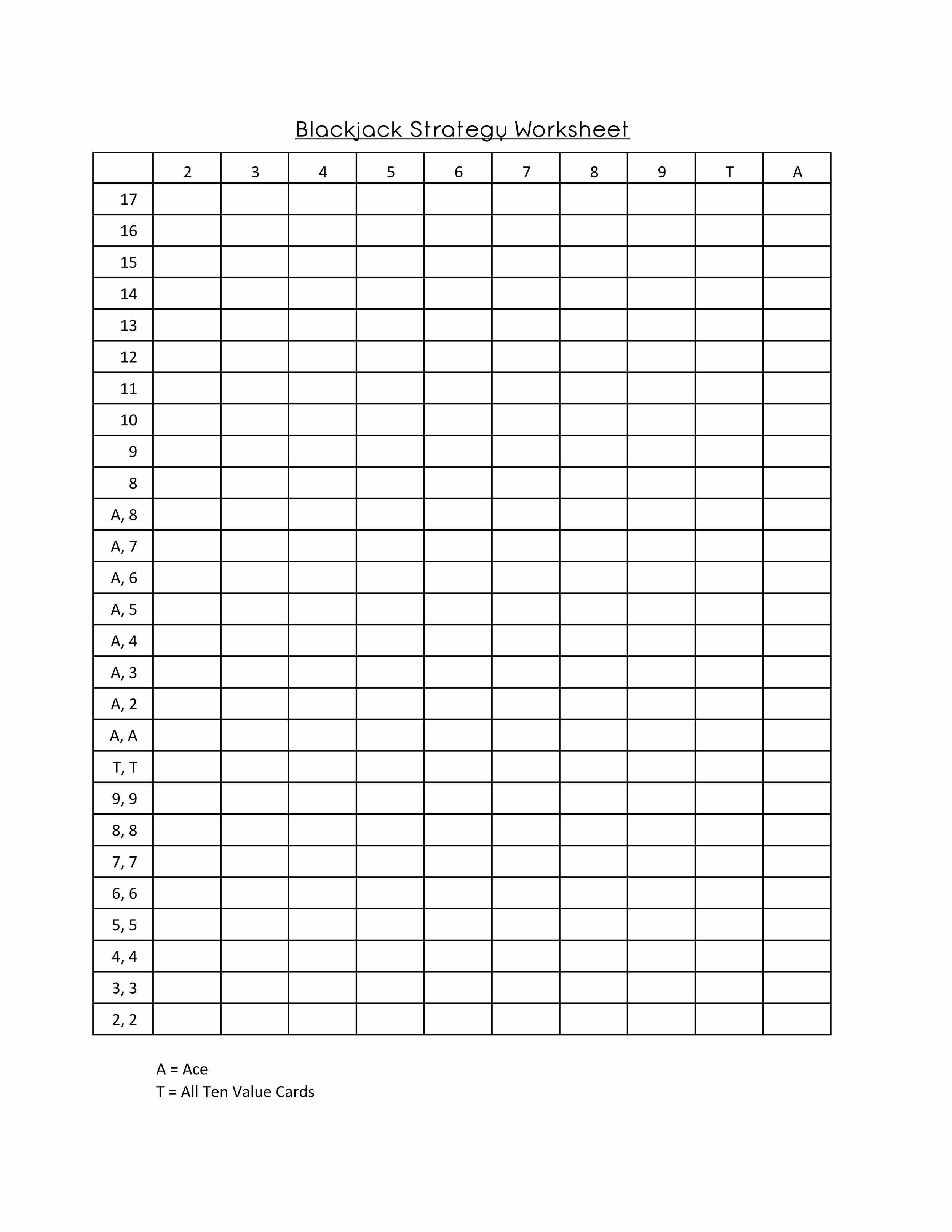Blackjack Probability Worksheet
Two worksheets, testing basic probability with dice, coloured balls and letters. The second worksheet is more difficult and introduces sampling with and without replacement. 2.1 Finding the Probability of Being Dealt a Blackjack. The term blackjack means that you get a value of 21 with only two cards (an ace and a card with that is worth 10). What is the probability of being dealt a blackjack with the rst two cards of a single deck of cards? 1.First, explore the experimental probability of being dealt a blackjack.
Thread Rating:
What are the chances of getting 4 blackjacks?
A single deck is used.
We get to play on 7 hands per game.
I'd encourage you to 'sound this out' and try to solve it yourself, even though I'm providing the info below. Problems like this sound really complicated, but really aren't when you 'sound it out' and take the probably one piece at a time.
In statistics when you need multiple events to happen (frequently when you use the word 'AND') the resulting probability is multiplicative... When any one of multiple events could happen (frequently when you use the word 'OR') the resulting probability is additive. Thus:
P(4 blackjacks) = P(1st blackjack) * P(2nd blackjack given 1st) * P(3rd blackjack given 1st 2) * P(4th blackjack given 1st 3)
P(1st blackjack) = P(1st ace BJ) OR P(1st 10 BJ) = P(1st ace 2nd 10) + P(1st 10 2nd ace) = [(4/52)*(16/51)] + [(16/52)*(4/51)] = (.0769*.3137) + (.3077*.0784) = .0241 + .0241 = .0482... or ~4.8% chance of getting dealt a blackjack (~1 in 21 hands, as shown previously by the Wiz).
P(2nd blackjack given 1st) = (same as above just remove one ace, 10, and 2 total cards from the deck)... [(3/50)*(15/49)]*2 = (.06*.3061)*2 = .0368, or ~3.7%
P(3rd blackjack given 1st 2) = (same as above with more removals)... [(2/48)*(14/47)]*2 = .0248, or ~2.5%
P(4th blackjack given 1st 3) = (same as above with more removals)... [(1/46)*(13/45)]*2 = .0126, or ~ 1.3%
Thus, P(4 blackjacks) = .0482 * .0368 * .0248 * .0126 = .0000005543, or ~ .00005543%... which is ~1 in 1.9 million.
I'd expect the payout to be a million bucks, and then they'd still be shorting you. So more than likely a terrible bet.
128/2652 * Number of hands = 128/2652 * 7 = 896/2652 ~ 1/3
Did you take into account that any of the 7 hands can make 4 blackjacks?
There are (7)C(4) = 35 groups of 4 players that can have the blackjacks
The first player can have any of 4 aces and any of 16 10-cards, or 64 possible hands
The second player can have any of the 3 remaining aces and any of the 15 remaining 10-cards, or 45 hands
The third player can have either of the 2 remaining aces and any of the 14 remaining 10-cards, or 28 hands
The fourth player can have the remaining ace and any of the 13 remaining 10-cards, or 13 hands
The first of the other three players can have any of the (44)C(2) remaining hands, the second any of the (42)C(2) remaining hands, and the third any of the (40)C(2) remaining hands.
Divide this product by (52)C(2) x (50)C(2) x (48)C(2) x (46)C(2) x (44)C(2) x (42)C(2) x (40)C(2), and you get about 1 / 51,685.
Simulation seems to confirm this calculation.
2 * (16/52 * 4/51) = 128/2652
128/2652 * Number of hands = 128/2652 * 7 = 896/2652 ~ 1/3
Did you take into account that any of the 7 hands can make 4 blackjacks?
I think he missed the part where it said they could play up to 7 hands.
If there are only 4 hands, the probability is about 1 / 1,808,900
If there are 5, about 1 / 361,800
If there are 6, about 1 / 120,600
6 x 2 x 15/50 x 3/49 = 540/2450
5 x 2 x 14/48 x 2/47 = 280/2256
4 x 2 x 13/46 x 1/45 = 104/2070
896/2652 x 540/2450 x 280/2256 x 104/2070 = 1/2153
I'd like to know if I am wrong please.
Thank you for your answers
...Did you take into account that any of the 7 hands can make 4 blackjacks?
No, I simply 4 hands in a row getting blackjack, without replacement.7 x 2 x 16/52 x 4/51 = 896/2652
6 x 2 x 15/50 x 3/49 = 540/2450
5 x 2 x 14/48 x 2/47 = 280/2256
4 x 2 x 13/46 x 1/45 = 104/2070
896/2652 x 540/2450 x 280/2256 x 104/2070 = 1/2153
I'd like to know if I am wrong please.
Thank you for your answers
 You are counting every deal 24 times.
You are counting every deal 24 times. You appear to be saying, 'Any of the 7 players can have any of the four Aces, and for each one, any of the other 6 players can have any of the three remaining Aces,' but you are counting each hand where, for example, Player A has the Ace of Spades and Player B has the Ace of Hearts twice.
Any of the 7 players can have the Ace of Spades, but you should then be multiplying it by 1/52 instead of 4/52. Similarly with the Aces of Hearts, Clubs, and Diamonds.
B = Black jack, X = Non-blackjack
BBBBXXX
BBBXBXX
BBBXXBX
BBBXXXB
BBXBBXX
BBXBXBX
BBXBXXB
BBXXBBX
BBXXBXB
BBXXXBB
BXBBBXX
BXBBXBX
BXBBXXB
BXBXBBX
BXBXBXB
BXBXXBB
BXXBBBX
BXXBBXB
BXXBXBB
BXXXBBB
XBBBBXX
XBBBXBX
XBBBXXB
XBBXBBX
XBBXBXB
XBBXXBB
XBXBBBX
XBXBBXB
XBXBXBB
XBXXBBB
XXBBBBX
XXBBBXB
XXBBXBB
Blackjack Probability Theory
XXBXBBB
Poker Probability Worksheet
XXXBBBB
This is probably not my most interesting post.